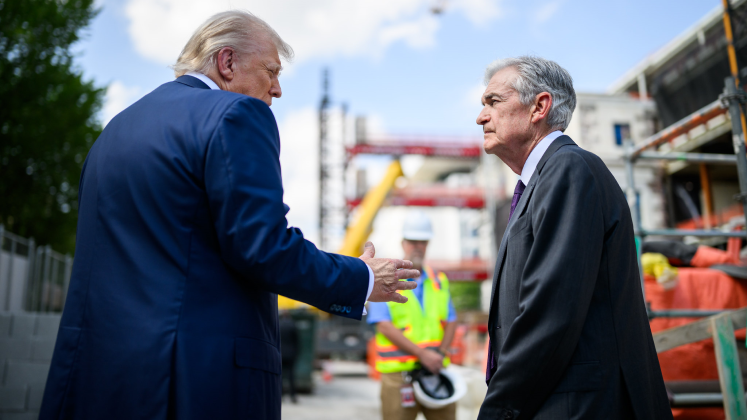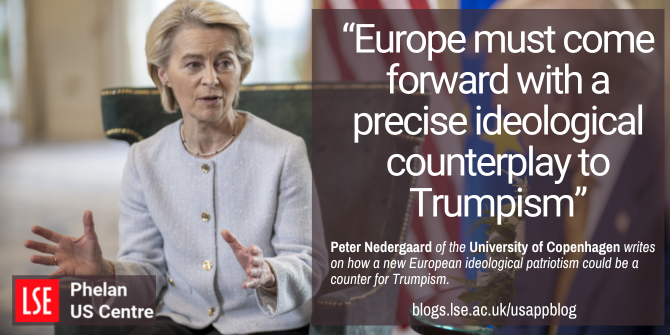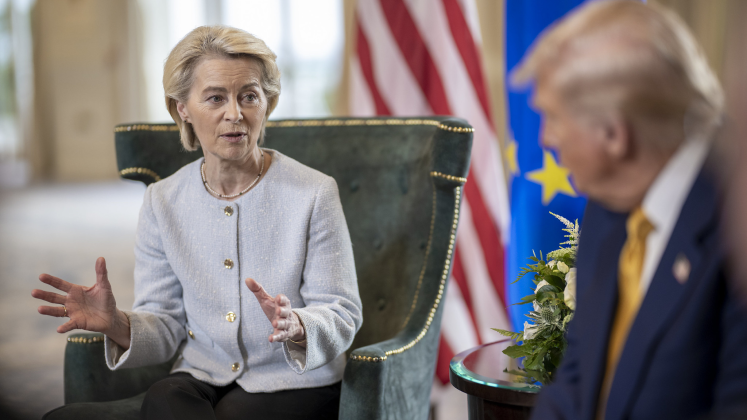 Donald Trump’s second administration has upturned many long-established approaches to political decision-making. Peter Nedergaard writes that Trump’s challenges to these approaches have included moving from a regime based on free trade to high tariffs, fiscal irresponsibility around the US’ public debt, a rejection of expertise in policymaking, and a merging of the corporate and political spheres. Europe, – through the EU – he argues, must step up to counter Trumpism by promoting its model of ordoliberalism and a new form of European patriotism.
Donald Trump’s second administration has upturned many long-established approaches to political decision-making. Peter Nedergaard writes that Trump’s challenges to these approaches have included moving from a regime based on free trade to high tariffs, fiscal irresponsibility around the US’ public debt, a rejection of expertise in policymaking, and a merging of the corporate and political spheres. Europe, – through the EU – he argues, must step up to counter Trumpism by promoting its model of ordoliberalism and a new form of European patriotism.
President Donald Trump’s assumption of power in the United States has challenged the usual Western approach to solving political problems, yet it is still praised by most decision-makers in Europe. Trumpism’s re-calibration is evident in a number of areas.
From free trade to high tariffs
First, there is Trump’s whole approach to free trade. We should note that it was not the case that the situation before Trump was a pure free-trade idyll. Europe, in the form of the EU, has been quite protectionist in certain areas, such as agricultural trade. The United States has also previously put up barriers to free trade. Under President Joe Biden, the so-called Inflation Reduction Act was passed, which, despite its name, is primarily about reallocating industrial production to the United States instead of importing. This was done, among other things, by providing tax benefits for domestic production.
The difference compared to now, however, is that both the EU and the US knew very well that the free trade-restricting behavior was not nice at the edges. Restrictions on free trade were not something to brag about. It was something that was done under strong pressure from voters and businesses for a period of time. However, despite these things, the goal was to continue to ensure free trade and preferably more of the same.
This attitude no longer applies to the Trumpist US. Free trade is apparently not an independent objective. More and persistently high tariffs are the situation that, by all accounts, will remain permanent as long as Trumpism is in power. The tariffs are intended to protect American companies and their jobs, even if the general interests represented by consumers lose a lot. And even if the American economy also becomes less dynamic and growth-oriented in the long term. There is also possibly a fiscal aspect to the massive tariffs imposed by the US, as they are intended to remedy the large deficit in the US public budgets.
Spiraling public debt
Second, there is Trumpism’s lack of fiscal responsibility. US public debt has been out of control for several years and is now at a level as if the US had been in a war for several years. The US national debt is now up to 122 percent of the gross domestic product compared to approximately 80 percent in the EU, and interest expenses already account for 17 percent of total US federal spending. This is one of the reasons why the credit rating agency Moody’s recently chose to downgrade the United States’ national credit rating.
Such a fiscal situation should lead to a cautious and very responsible fiscal policy. That is not the case. With the legislative package with the promotional name “One Big Beautiful Bill,” Trump has added fuel to the already existing fiscal irresponsibility in the United States. The legislative package includes, among other things, an extension of Trump’s tax cuts from 2017 aimed at those on high incomes, better deduction options, and tax exemption for overtime. The tax cuts are intended to stimulate the American economy and thereby mitigate some of the negative effects that higher tariffs have on consumption.
However, studies have shown that the expected contribution to GDP growth is significantly smaller than the increase in national debt. For a country’s debt growth to be considered responsible in the long term, it must not exceed economic growth. According to calculations made by Penn Wharton University of Pennsylvania, the US gross domestic product will be 0.3 percent lower in ten years as a result of Trump’s “big, beautiful” legislative package. The national debt, on the other hand, will be 7.7 percent higher.
No more time for experts
A third element of Trumpism is an attack on almost any form of professionalism and expertise. Just to name a few recent examples. The chairperson of the US central bank, the Federal Reserve, Jerome Powell, has been heavily criticized by Trump and threatened with dismissal because he does not lower the US interest rate.

President Donald Trump speaks to Fed Chair Jerome Powell during a tour of the Federal Reserve in Washington, D.C., Thursday, July 24, 2025. (Official White House Photo by Daniel Torok)
“P20250724DT-0581” by The White House, United States Government Work
However, a reduction of the level of interest rates would be both unethical and irresponsible given current levels of US public debt and inflation. Trump’s pressure is violating an important principle of central bank independence that applies in Europe. Germany’s Bundesbank was established in 1957 based on this principle. It was a success. That is why the European Central Bank, the ECB, also had central bank independence as a basic principle. Having a central bank independent of political pressure has been tested over the years, and it has proven to be a great advantage. It is fundamentally crucial for ensuring the “neutrality of money,” which means that the value of money is not influenced by short-term political considerations.
Another example of the Trump administration’s expert criticism concerns the firing of the head of the central administration’s employment statistics unit, Erika McEntarfer. The reason was that, according to the statistics unit, only 73,000 new jobs were created in the United States in July, a figure that Trump’s circle was very unhappy with. The firing of McEntarfer damages confidence in whether we can trust in the future that the American employment figures, which are so important for a true assessment of the health of the American economy, are correct.
The merging of the corporate and political spheres
A fourth component of Trumpism is the apparent intertwining of economic and political power. This intertwining was strikingly illustrated at a service at St. John’s Church in Washington, D.C., on Donald Trump’s inauguration day, January 20, where Amazon founder Jeff Bezos, Meta CEO Mark Zuckerberg, Apple CEO Tim Cook, and Google CEO Sundar Pichai were been given prominent positions. The images of billionaires close to political power in the United States went around the world and were received as they were probably intended: that the billionaires of American tech giants, who are often completely dominant in the world market, have the special attention of political power in the United States.
Since Trump took power, there have also been examples of unusual parallel activities between Trump’s actions as president and Trump’s private financial interests—for example, in the form of the launch of a special cryptocurrency with the White House as the backdrop. A gift to Trump in the form of a large plane from the Emir of Qatar during a state visit has also been highlighted. I am not claiming that there is any kind of causal connection between the actions of specific corporate actors and specific parts of the political decision-making process under the Trump administration, but the parallels between the corporate economic and political spheres in the United States are interesting.
The European model of ordoliberalism
So far, top European politicians have been scheming in secret, while in public and towards Trump, they have been distinctly servile. This is no longer a sustainable way of acting. Instead, Europe must come forward with a precise ideological counterplay to Trumpism. Sometimes reference is made in this connection to the fact that Europe’s position is to stand guard over liberal democracy. This is of course true, but it is also very imprecise. Free trade or not, more or less central bank independence, public sector indebtedness, fiscal responsibility or not, the degree of linkage between large companies and state power, and similar phenomena are not something that liberal democracy as a complex of ideas has a precise position in relation to. Therefore, we must go further down the level of abstraction if and when we are to find a consistent ideological counter-play to Trumpism.
Fortunately, there is an ideological position in Europe that is anti-Trumpist on all the points mentioned above. It hits Trumpism ideologically like a well-placed penalty kick in the ankle. It is ordoliberalism, the idea that the state has a strong role in ensuring that the free market performs as well as it can.
When it comes to trade, ordoliberal thinkers—e.g., Walter Eucken, Wilhelm Röpke, Alexander Rüstow, Alfred Müller-Armack, and Viktor Vanberg—have always been principled supporters of progressive free trade. Yet, it should, as far as possible, be an orderly free trade according to more or less the same set of rules, which ideally should be based on a kind of international order á la the EU’s set of rules, or at least the set of rules on which the World Trade Organization is founded. Trump’s disruptive trade policy practices are completely destructive of the stability and predictability that international trade must be based on, according to the ordoliberals, because only such a thing promotes investment in product development and marketing, since companies then know exactly the terms of trade. Conversely, according to the same people, Trump’s disorderly policies are poison to the trade that makes countries richer.
In terms of fiscal responsibility, the EU is unique in that it is structured as an Economic and Monetary Union, where rules have been adopted that countries may have a maximum annual public deficit of three percent of gross domestic product and an accumulated maximum debt ratio of 60 percent. These rules have not always been adhered to and have also been suspended in periods of crisis. Nevertheless, they have had the effect of significantly reducing public spending in the member states, so that in the EU fewer bills are passed on to descendants for public spending adopted by current generations.
There is research evidence for the claim that ordoliberalism has decisively contributed to the EU being in a much better fiscal situation today and with a total of far less public debt than the US. Ordoliberalism has otherwise been accused in the Anglo-Saxon world and among leftists in the EU of being responsible for austerity in fiscal policy. However, the situation, without tough fiscal policy would be much worse. This is especially true for those who are economically at the bottom of society. Again, the US is a scary example.

“P20250727DT-0829” by The White House, United States Government Work
Embracing evidence in political decision-making
A common thread throughout the development of ordoliberalism—it emerged in Germany as a reaction to the chaotic Weimar Republic and the atrocities of the Nazi regime—is the desire for political decisions to be based on the most up-to-date scientific knowledge and expertise. Politicians should not conduct politics on hunches or rely on rumors and theories without evidence, and it is the task of experts and science to make the most up-to-date knowledge available for the political decision-making process. In the Federal Republic of Germany, an economic council composed of economics professors was established early on, at the behest of the ordoliberals. For decades, it has advised politicians on economic policy, business policy, and the like. The advice from the German Economic Council has—at least in the public German debate—an almost sacrosanct character.
Yet, the Trump administration’s failure to acknowledge the facts is not just about economic and employment policy. The current US government also questions the evidence from climate science that there is a strong connection between human-made greenhouse gas emissions and rising average temperatures around the globe. Trump has pulled the US out of the Paris Agreement on limiting greenhouse gas emissions and is generally freewheeling in international climate policy. Instead, they are openly focusing on extracting more oil and gas. “Drill, baby, drill,” as they say in that camp. All of this is, of course, becoming increasingly ironic in a situation where global temperatures are rising and rising, where summers in certain regions are becoming almost unbearable, and even the most climate-ignorant can experience for themselves that something is completely wrong.
The intertwining of economic and political power is also something that gives rise to strong criticism in ordoliberal circles. With the experience of the deeply lobby-infected Weimar Republic and the existence of the so-called Hitler Monopolies from 1933 to 1945—e.g., Hoechst, Krupp Stahlwerke, and I. G. Farben—the claim is that it is the state’s task, through a tough competition policy, to undermine the possibility of companies gaining so much power in the market that it can be converted into political capital.
How a new European patriotism can resist Trumpism
According to ordoliberals, the fundamental fatality of strong economic lobbying is that it undermines democracy. Economic power translated into political power means that it is the powerful corporate actors who have their wishes met to a greater extent compared to the many ordinary consumers and citizens without strong interest organizations behind them. Therefore, according to ordoliberals, the state must be so independent and strong that it does not end up in the pockets of powerful corporate actors and their interest organizations, while at the same time competition policy takes the fangs out of the latter.
The US, led by Trump, has left many of the principles on the platform that European states are built on. Most people can see that it is crazy. On the other hand, there is a serious lack of a principled response that can be served both internally in Europe and externally towards the US. This is not to create confrontation.
However, Europe is not served by the lack of precise, tested, and nuanced responses to Trumpism. Neither is the United States. This applies to the many millions of Americans who do not think Trump is the best idea. But it probably also applies to Trump and his administration, which, by all accounts, only despises those who kneel at their feet. In other words, the time has come for what Wilhelm Röpke once called European patriotism. It must also be bound together by some spiritual strings. It must also be ideological.
